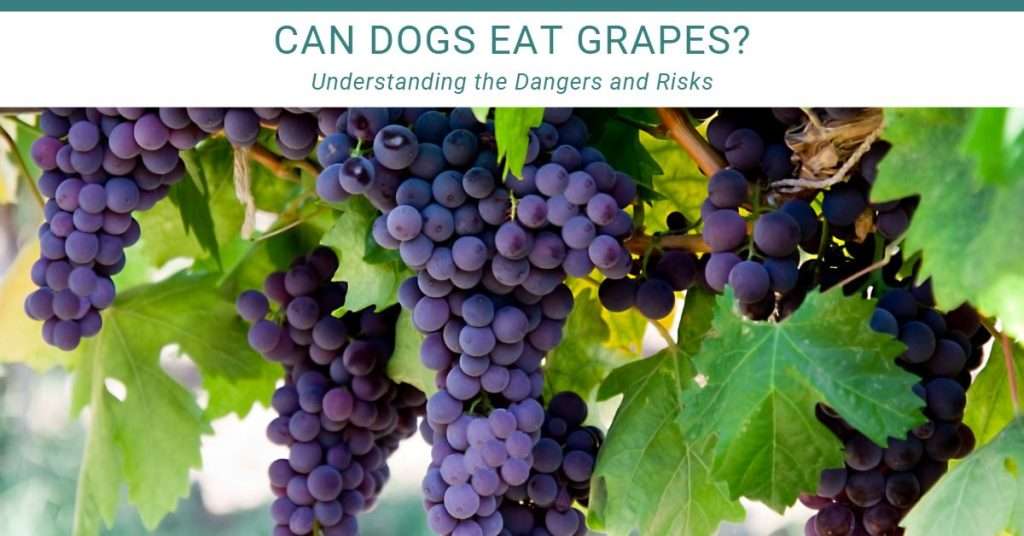Dangers of Grapes for Dogs: Understanding Toxicity and Risks
As dog owners, we often share our food with our furry companions, but it’s crucial to be aware of what’s safe and what can be potentially harmful. Grapes, a seemingly innocent and delicious fruit for humans, can actually be toxic to our canine friends. In this comprehensive guide, we will delve into the topic of dogs; can dogs eat grapes? exploring the risks involved and the importance of avoiding this potentially harmful fruit.
The Toxicity of Grapes to Dogs

Grapes, whether fresh or dried as raisins, can have devastating effects on dogs. The exact toxic component in grapes is still unknown, which makes it all the more important to err on the side of caution and keep them away from our furry friends. Luckily I have never had to say my dog ate grapes and died. I have never owned a dog that has tried to eat a grape, but that does not mean all breeds are the same. Neither of my German Shepherds would do more then sniff them when one of my kids dropped one.
Overview of Grape Toxicity
Grapes and raisins contain a toxic substance that can lead to severe complications in dogs. The severity of the toxicity can vary from dog to dog, making it difficult to predict how an individual dog may react to the ingestion of grapes. When it comes to grapes, even a single one is too many. So there you have it, if you are asked can dogs eat grapes, you now know the answer is absolutely not!
According to a study published in the Journal of Veterinary Internal Medicine, grape toxicity can result in acute kidney injury, with symptoms ranging from vomiting and diarrhea to decreased urine production and lethargy [1]. It’s alarming how even a small amount of grapes can have serious consequences for our beloved canine companions.
Potential Health Risks
The ingestion of grapes can result in various health risks for dogs. The kidneys are particularly vulnerable to grape toxicity, and if left untreated, it can lead to kidney damage and potentially even kidney failure. For this reason it is very important that you either contact poison control or your veterinarian immediately. They may ask you to induce vomiting in the dog.
In a study conducted at the Animal Poison Control Center, it was found that ingestion of grapes or raisins resulted in acute renal failure in some dogs [2]. The exact mechanism of toxicity is still not fully understood, which makes it all the more critical to prevent our dogs from consuming grapes.
Symptoms and Signs of Grape Toxicity In Dogs
Recognizing the signs of grape toxicity is crucial for early intervention and prompt veterinary care
Immediate Symptoms:
Immediate symptoms of grape ingestion in dogs may include:
- Vomiting
- Diarrhea
- Abdominal pain
If you notice your dog exhibiting any of these signs after consuming grapes, it’s vital to seek immediate veterinary attention. Don’t wait for symptoms to worsen or hope they will subside on their own.
Delayed Symptoms:
In some cases, symptoms of grape toxicity in dogs may not appear immediately after ingestion, which adds to the challenge of identifying and addressing the issue. It’s important to be aware of potential delayed symptoms, which can include:
- Kidney problems: Grape toxicity can lead to acute kidney injury, causing damage to the kidneys and potentially leading to kidney failure if not treated promptly.
- Lethargy: Dogs affected by grape toxicity may become unusually tired or sluggish, showing decreased energy levels and overall activity.
- Decreased urine production: The kidneys play a crucial role in urine production, and grape toxicity can impair their function, resulting in reduced urine output or changes in urination patterns.
- Overall decline in health: Dogs experiencing grape toxicity may exhibit a general decline in health, including loss of appetite, weight loss, and a lack of interest in usual activities.
It’s important to note that not all dogs show symptoms immediately after grape ingestion, and some may develop issues even after a delay. This unpredictability highlights the necessity of regular monitoring and proactive veterinary care, even if initial symptoms are absent. By closely observing your dog’s behavior, appetite, and overall well-being, you can detect any potential signs of grape toxicity and seek timely veterinary assistance to ensure the best possible outcome for your furry friend.
Why are Grapes Toxic to Dogs?

Despite extensive research, the exact toxic component in grapes remains unknown. However, there are several theories surrounding grape toxicity in dogs.
The Unknown Toxic Component:
Scientists are actively investigating the specific substance responsible for grape toxicity. The toxic component in grapes affects dogs differently from other species, such as cats or humans. Until more is understood, it’s crucial to avoid feeding grapes to dogs altogether.
Individual Sensitivities:
Dogs’ sensitivity to grapes can vary greatly, making it challenging to predict the outcome of grape ingestion. Breeds, sizes, and individual differences all play a role. To ensure your dog’s safety, it’s best to steer clear of grapes and raisins entirely.
What to Do If Your Dog Eats Grapes
If you suspect or discover that your dog has ingested grapes, taking immediate action is crucial to minimize potential harm.
A. Immediate Action: Contact your veterinarian or a pet poison control hotline immediately. They can provide guidance on the next steps to take based on your dog’s specific situation. Time is of the essence, so don’t delay seeking professional help.
B. Medical Treatment: Veterinarians may employ various treatments depending on the circumstances. These may include inducing vomiting, administering activated charcoal to absorb toxins, intravenous fluids for hydration, and monitoring kidney function. Prompt veterinary care greatly increases the chances of a positive outcome.
Safe Alternatives and Treats for Dogs
Instead of grapes, there are plenty of safe and healthy alternatives that dogs can enjoy.
A. Dog-Friendly Fruits: Opt for dog-friendly fruits that provide nutritional benefits without the risks associated with grapes. Apples, blueberries, watermelon, and bananas are excellent choices, packed with vitamins, antioxidants, and fiber.
B. Commercial Treats: Explore commercially available dog treats specifically formulated to meet canine dietary needs. Look for treats made from quality ingredients and trusted brands to ensure the well-being of your furry friend.
It’s important to remember that dogs have unique dietary needs, and not all fruits and treats are suitable for every dog. When introducing new foods, always do so in moderation and monitor your dog for any adverse reactions.
References:
- Martinez, M. et al. (2002). Acute renal failure in dogs after the ingestion of grapes or raisins: A retrospective evaluation of 43 dogs (1992-2002). Journal of Veterinary Internal Medicine, 16(3), 244-251.
- Dunayer, E. (2003). New findings on the mechanism of action and toxicosis of grapes and raisins in dogs. Veterinary Medicine, 98(3), 207-211.
Can dogs eat grapes FAQ?
Can one grape kill a dog?
Yes, unfortunately a single grape can kill a dog. If your dog ate a grape or raisin, it is important to contact a veterinarian immediately. You may need to induce vomiting and make sure the dog expelled whichever toxic form of a grape it ate.
Why can’t dogs eat grapes?
The actual reason why dogs cant eat grapes is still unknow, there is some chemical compound in the grapes that will cause renal failure(kidney failure) if enough are consumed. There is not cure, once the chemical hits the dogs kidneys, they will most likely perish. It is very important to get the dog seen by a veterinarian immediately.
My dog ate 10 grapes, what should I do?
This would be considered a medical emergency especially if you have a small dog. You should contact a veterinarian immediately. You will most likely have to induce vomiting + count the grapes that come out to make sure they don’t get digested by your dog.
Summary: Can Dogs Eat Grapes?
Grapes are toxic to dogs, potentially leading to severe health complications, including kidney damage or death.
It’s essential to recognize the risks involved and avoid feeding grapes or raisins to your canine companion.
- Dogs Should not be allowed to eat Grapes, Raisins, or any other currants.
- Here are some fruits you can feed your dog: Pomegranate, Apples, Nectarines
- If your dog does eat grapes, contact your dogs veterinarian immediately, you may need to induce vomiting at home.
Disclaimer: This blog post is for informational purposes only and should not replace professional veterinary advice. Always consult with your veterinarian regarding your dog’s specific dietary needs and potential risks associated with certain foods.



